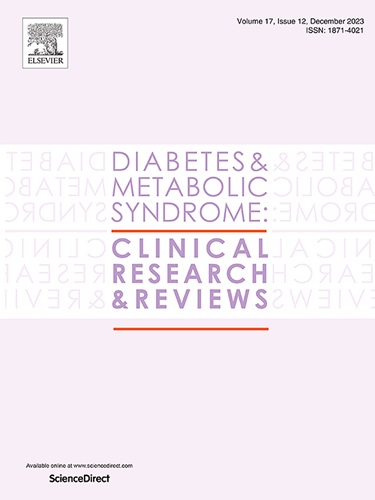有急性胰腺炎病史的 2 型糖尿病或肥胖症患者使用塞马鲁肽和替扎帕肽可降低复发急性胰腺炎的风险:基于TriNetX数据库的倾向匹配全球联合回顾性队列研究
IF 3.4
Q1 ENDOCRINOLOGY & METABOLISM
Diabetes & Metabolic Syndrome-Clinical Research & Reviews
Pub Date : 2024-09-01
DOI:10.1016/j.dsx.2024.103116
引用次数: 0
摘要
背景急性胰腺炎(AP)是一个重大的健康问题,有可能反复发作并引发严重并发症。2型糖尿病(T2D)或肥胖症患者的复发风险会受到各种因素和治疗方法的影响,包括GLP-1受体激动剂(GLP-1RA)。本研究评估了有 AP 病史的患者复发 AP 的风险,重点关注不同 GLP-1RA 治疗方法的影响。方法我们利用 TriNetX 平台开展了一项回顾性队列研究,研究对象包括 258,238 名有 AP 病史的 T2D 或肥胖患者。结果GLP-1RA使用者的AP复发率明显降低,无风险因素者显示GLP-1RA使用者的复发率为13.8%,而非使用者为40.9%。塞马鲁肽和替扎帕肽显示出最有利的结果;塞马鲁肽使用者的复发率低于艾塞那肽(10.1% 对 27%),略低于度拉鲁肽(13.6% 对 15.4%),但度拉鲁肽的复发率在统计学上并不显著。结论 GLP-1RA,尤其是塞马鲁肽和替唑帕肽,可降低 T2D 或肥胖症患者 AP 复发的风险。这些药物之间的风险差异凸显了进一步研究和个性化治疗方案的必要性。本文章由计算机程序翻译,如有差异,请以英文原文为准。
Decreased risk of recurrent acute pancreatitis with semaglutide and tirzepatide in people with type 2 diabetes or obesity with a history of acute pancreatitis: A propensity matched global federated TriNetX database-based retrospective cohort study
Background
Acute pancreatitis (AP) is a significant health concern with potential for recurrent episodes and serious complications. The risk of recurrence in type 2 diabetes (T2D) or obesity can be influenced by various factors and treatments, including GLP-1 receptor agonists (GLP-1RAs). This study evaluates the risk of recurrent AP among patients with a history of the condition, focusing on the effects of different GLP-1RA treatments.
Objectives
Our objective is to compare the recurrence risks of AP between patients treated with different GLP-1RAs.
Methods
We conducted a retrospective cohort study using the TriNetX platform, encompassing 258,238 individuals with T2D or obesity who have a history of AP. We assessed the recurrence of AP over a five-year period, analyzing data on treatment regimens, with a focus on the use of Semaglutide, Tirzepatide, and other GLP-1RAs.
Results
GLP-1RA users experienced significantly lower recurrence rates of AP, with those without risk factors showing GLP-1RA users had a recurrence rate of 13.8 % compared to 40.9 % for non-users. Semaglutide and Tirzepatide showed the most favorable outcomes; Semaglutide users had lower recurrence rates than Exenatide (10.1 % vs. 27 %) and slightly lower than Dulaglutide (13.6 % vs. 15.4 %), though not statistically significant with Dulaglutide. Tirzepatide users displayed the lowest recurrence risk at 6.2 %, significantly lower than those on Semaglutide (11.7 %).
Conclusions
GLP-1RAs, particularly Semaglutide and Tirzepatide, are associated with a reduced risk of recurrent AP in people with T2D or obesity. The differential risk profile between these drugs highlights the need for further studies and personalized treatment plans.
求助全文
通过发布文献求助,成功后即可免费获取论文全文。
去求助
来源期刊

Diabetes & Metabolic Syndrome-Clinical Research & Reviews
ENDOCRINOLOGY & METABOLISM-
CiteScore
22.90
自引率
2.00%
发文量
248
审稿时长
51 days
期刊介绍:
Diabetes and Metabolic Syndrome: Clinical Research and Reviews is the official journal of DiabetesIndia. It aims to provide a global platform for healthcare professionals, diabetes educators, and other stakeholders to submit their research on diabetes care.
Types of Publications:
Diabetes and Metabolic Syndrome: Clinical Research and Reviews publishes peer-reviewed original articles, reviews, short communications, case reports, letters to the Editor, and expert comments. Reviews and mini-reviews are particularly welcomed for areas within endocrinology undergoing rapid changes.
 求助内容:
求助内容: 应助结果提醒方式:
应助结果提醒方式:


